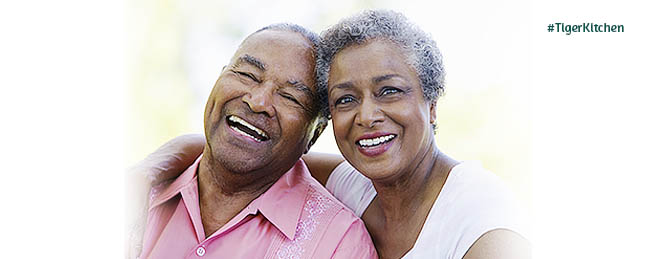Making healthy food choices is a smart thing to do — no matter how old we are, our body changes as we get older. Food provides nutrients we need as we age. Use these tips to choose foods for a healthy lifestyle.
Drink more water
Drink plenty of fluids every day to stop you from getting dehydrated. Drink at least 6 times a day, or more during warm weather or if you’re exercising. Tea, coffee, mineral water, soda water, and reduced-fat milk can all count towards your fluid intake during the day, but water is always best. 100% juice also helps you stay hydrated. Limit beverages that have lots of added sugars or salt. Learn which liquids are better choices and go for it.
Make eating a social event
Meals are more enjoyable when you eat with others. Invite a friend to join you or take part in a potluck at least twice a week. Meals are a great way to gather with loved ones and socialize. Ask your loved one’s family members or friends over for lunch.
Have a healthy weight
Maintaining a healthy weight is important for overall health and well-being. As we get older, eating the same types and amounts of food but do not become more active, you will probably gain weight. Being underweight isn’t healthy either and maybe a sign that you’re not eating enough or that you’re unwell. As a rule of thumb, the more calories you eat, the more active you have to be to maintain your weight. Likewise, the reverse is also true—the more active you are, the more calories you need. As you age, your body might need less food for energy, but it still needs the same amount of nutrients.
Plan healthy meals
Planning healthy meals isn’t difficult; it just takes a bit of practice. Find an example of a healthy diet, with a one-week menu of healthy foods. Also, find an interesting and flexible way to choose and prepare tasty meals so you can eat the foods you need. However, Learn to recognize how much to eat so you can control portion size. When eating out, pack part of your meal to eat later.
Eat for your teeth and gums
Many people find that their teeth and gums change as they age. People with dental problems sometimes find it hard to chew fruits, vegetables, or meats. Don’t miss out on the needed nutrients! Eating softer foods can help. Try cooked or canned foods like unsweetened fruit, low-sodium soups, or canned tuna.
Use herbs and spices
Foods may seem to lose their flavour as you age. If the favourite dishes taste different, it may not be the cook! Maybe your sense of smell, sense of taste, or both has changed. Add flavour to your meals with herbs and spices. Every time you flavour your meals with herbs or spices you are literally “upgrading” your food without adding a single calorie. You are taking something ordinary and turning it into something extraordinary by adding colour, flavour, vitamins, and often medicinal properties which are also healthy as we age.
Keep food safe
Healthy eating means more than managing calories or choosing a balanced diet of nutrient-rich foods. The best healthy eating plans also involve safe food handling, cooking, and storage practices that help prevent food poisoning. Don’t take a chance with your health. A food-related illness can be life-threatening for an older person. Throw out food that might not be safe. Avoid certain foods that are always risky for an older person, such as unpasteurized dairy foods.
Read the Nutrition Facts label
The nutrition facts label tells you what’s in the food you’re eating. It helps you determine if you have a healthy, balanced diet. Every packaged or processed product should have a label. Make the right choices when buying food. Pay attention to important nutrients to know as well as calories, fats, sodium, and ask your doctor if there are ingredients and nutrients you might need to limit or to increase.
Foodies, we hope you had a good read, what other ways have a healthy lifestyle helped you to live better? We can’t wait to hear from you.


